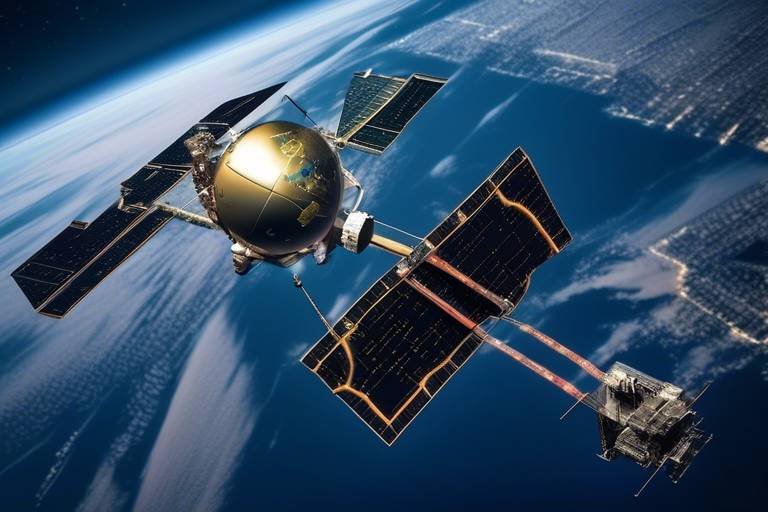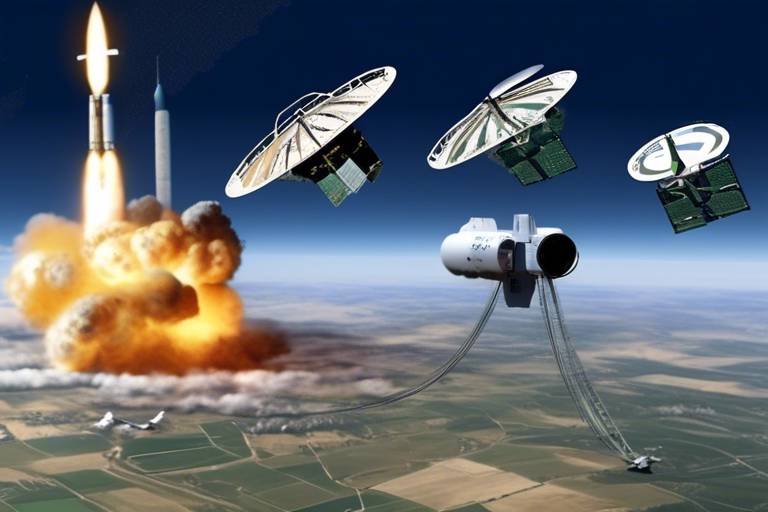The Future of Space-Based Logistics for Defense Operations
As we stand on the brink of a new era in defense capabilities, the concept of space-based logistics emerges as a game-changer. Imagine a world where military operations are not constrained by earthly limitations; where supplies, intelligence, and resources flow seamlessly from the stars. This isn't science fiction—it's the future of defense logistics. With rapid advancements in technology, the integration of space logistics into military operations promises to revolutionize how armed forces operate globally. But what does this mean for the future of warfare and global security?
In this article, we will dive deep into the evolving landscape of space-based logistics, exploring the technological advancements that are paving the way for this transformation. We will also discuss the strategic implications of these innovations, examining how they can enhance operational efficiency and effectiveness in military operations. By understanding the potential of space logistics, we can better appreciate its role in shaping the future of defense.
At its core, space-based logistics is about more than just delivering supplies; it’s about creating a network of interconnected capabilities. This network enables armed forces to respond faster to crises, maintain operational readiness, and ensure that troops have what they need when they need it—no matter where they are in the world. As we explore this topic, we will uncover the challenges and opportunities that lie ahead, ultimately revealing how space logistics can support a more secure and responsive defense posture.
The backbone of space-based logistics is a suite of emerging technologies that are transforming how military operations are conducted. Innovations such as advanced satellite systems, autonomous drones, and artificial intelligence are at the forefront of this transformation. These technologies enable faster and more efficient supply chains, allowing for real-time tracking of resources and improved delivery times.
For instance, consider the role of satellite systems. They provide critical data for navigation, communication, and reconnaissance, ensuring that military units can operate effectively even in the most remote locations. Meanwhile, autonomous drones can deliver supplies directly to troops on the ground, reducing the time it takes to get essential materials into the hands of those who need them most.
Moreover, the integration of artificial intelligence in logistics management can optimize supply routes, predict demand, and automate inventory management. This not only reduces costs but also enhances reliability, ensuring that military operations are not hindered by logistical challenges.
Understanding the strategic significance of space logistics is crucial for modern defense operations. As military engagements become increasingly global, the ability to coordinate resources and support operations from space is paramount. Space logistics enhances global reach, supports rapid deployment, and ensures sustained operations in challenging environments.
One of the key advantages of space logistics is its ability to integrate global supply chains. By leveraging satellite technology and advanced communication systems, military units can coordinate their efforts seamlessly. This integration allows for real-time resource allocation, ensuring that supplies reach their destination without delay. Imagine a scenario where a unit deployed in a remote area can receive essential supplies within hours, thanks to an efficient space logistics system. This capability could be the difference between mission success and failure.
The importance of enhancing interoperability with allied forces cannot be overstated. Space logistics facilitates coordinated efforts between nations, improving response times and operational effectiveness across multinational military engagements. By establishing common logistics frameworks and sharing resources, allied forces can operate more cohesively, ensuring that they are prepared to face any threat.
However, with great power comes great responsibility. Effective risk management strategies are vital in space logistics to mitigate potential disruptions. This involves anticipating challenges and developing contingency plans to ensure that defense operations remain resilient and capable of adapting to unforeseen circumstances. By prioritizing risk management, military organizations can safeguard their operations and maintain a strategic edge.
Implementing space-based logistics can lead to significant cost savings and resource optimization. By streamlining supply chains and utilizing advanced technologies, defense organizations can allocate budgets more effectively while maintaining high operational readiness. This not only enhances efficiency but also allows for better planning and execution of military operations.
Despite its potential, space-based logistics faces several challenges that must be addressed. Regulatory hurdles, technological limitations, and security concerns are just a few of the obstacles that could hinder the full realization of its benefits for defense operations.
Establishing robust regulatory and policy frameworks is essential for guiding the development and implementation of space logistics. This ensures compliance with international laws and fosters collaboration among nations. Without a clear framework, the potential for conflict and miscommunication increases, jeopardizing the effectiveness of space logistics.
Identifying technological limitations in current space logistics systems is crucial for driving innovation. Solutions may focus on advanced materials, improved communication technologies, and the integration of AI to enhance operational capabilities. By overcoming these limitations, we can unlock the full potential of space logistics and revolutionize defense operations.
- What is space-based logistics? - Space-based logistics refers to the use of space technologies and systems to support military operations by improving supply chain efficiency and resource allocation.
- How can space logistics enhance military readiness? - By providing real-time coordination and fast delivery of supplies, space logistics ensures that military units can operate effectively in any environment.
- What challenges does space logistics face? - Key challenges include regulatory hurdles, technological limitations, and security concerns that need to be addressed for effective implementation.
Emerging Technologies in Space Logistics
In the ever-evolving realm of defense operations, emerging technologies are playing a pivotal role in revolutionizing space logistics. Innovations such as satellite systems and autonomous drones are not just buzzwords; they are the backbone of a new era in military supply chains. Imagine a world where supplies can be delivered to troops in the most remote locations without the delays of traditional logistics. This is becoming a reality, thanks to advancements in technology that are streamlining processes and enhancing efficiency.
Take satellite systems, for instance. These sophisticated devices are crucial for real-time data transmission, allowing military planners to track inventory levels and supply routes with pinpoint accuracy. By utilizing high-resolution imagery and GPS technology, commanders can make informed decisions on resource allocation, ensuring that every soldier has what they need, when they need it. This capability not only enhances operational readiness but also reduces waste and improves sustainability.
On the other hand, autonomous drones are emerging as game-changers in the logistics landscape. These aerial vehicles can traverse difficult terrains and deliver supplies directly to frontline units, bypassing traditional transportation hurdles. Imagine a drone swooping down to deliver critical medical supplies or munitions while dodging enemy radar. The speed and agility of these drones mean that troops can receive essential resources almost instantaneously, significantly improving their effectiveness in the field.
Furthermore, the integration of artificial intelligence (AI) into logistics operations is set to enhance decision-making processes. AI algorithms can analyze vast amounts of data to predict supply needs, optimize delivery routes, and even foresee potential disruptions. This level of foresight allows military leaders to adapt quickly, ensuring that their forces remain agile and responsive to changing battlefield conditions.
To illustrate the impact of these technologies, consider the following table that outlines the key benefits of emerging technologies in space logistics:
| Technology | Benefits |
|---|---|
| Satellite Systems | Real-time tracking, improved inventory management, enhanced situational awareness |
| Autonomous Drones | Rapid delivery, access to remote areas, reduced risk to personnel |
| Artificial Intelligence | Data analysis, predictive logistics, optimized resource allocation |
As we look to the future, the potential of these technologies is boundless. The fusion of satellite communication, drone technology, and AI is creating a robust framework for logistics that can adapt to the complexities of modern warfare. However, this transformation also demands a shift in mindset, as military organizations must embrace innovation and be willing to invest in these technologies to remain competitive.
In conclusion, the landscape of space logistics is rapidly changing, propelled by emerging technologies that promise to enhance operational efficiency and effectiveness. The military's ability to leverage these advancements will not only improve supply chains but also redefine the way defense operations are conducted in the years to come.
Strategic Importance of Space Logistics
In today's fast-paced world, the cannot be overstated, especially in the realm of defense operations. Imagine a scenario where military units are deployed to remote locations, far from traditional supply chains. How do they receive the necessary equipment and supplies? This is where space logistics comes into play, acting as the backbone of modern military operations. By leveraging advanced technologies, defense organizations can ensure that their forces are equipped and ready, no matter the circumstances.
One of the key benefits of space logistics is its ability to enhance global reach. With the capability to deploy resources anywhere on the globe, military operations can be executed swiftly and effectively. This is particularly crucial in emergency situations where time is of the essence. For instance, during a humanitarian crisis or a sudden conflict, having the ability to deliver supplies via space logistics can mean the difference between success and failure. Additionally, space logistics supports rapid deployment, allowing military forces to mobilize quickly in response to emerging threats.
Furthermore, space logistics plays a vital role in ensuring sustained operations in challenging environments. Think about it: in the harsh conditions of a battlefield, maintaining a steady supply of food, ammunition, and medical supplies is critical. Space logistics provides a reliable method for delivering these essentials, even when terrestrial routes are compromised. This capability not only enhances operational efficiency but also boosts the morale of troops who know that they can rely on timely support.
To illustrate the impact of space logistics on military operations, consider the following table:
| Aspect | Traditional Logistics | Space Logistics |
|---|---|---|
| Deployment Speed | Slow, reliant on ground transport | Fast, direct delivery via satellites |
| Global Reach | Limited by infrastructure | Unlimited, can access remote areas |
| Supply Chain Resilience | Vulnerable to disruptions | More resilient, less affected by ground issues |
Moreover, the integration of space logistics with existing military operations leads to improved interoperability with allied forces. In joint operations, seamless coordination is essential. Space logistics facilitates this by providing a common framework for resource allocation and supply chain management. When allied forces can communicate and share logistics data through space-based systems, they can respond more effectively to threats, ultimately enhancing overall operational effectiveness.
Lastly, the importance of risk management in space logistics cannot be ignored. As with any operation, there are inherent risks involved, from technological failures to potential security breaches. By implementing effective risk management strategies, defense organizations can mitigate these risks, ensuring that their logistics operations remain resilient and adaptable. This adaptability is crucial in a world where the only constant is change.
- What is space logistics? Space logistics refers to the use of space-based systems and technologies to manage and deliver supplies and resources for military operations.
- How does space logistics improve military efficiency? By enabling rapid deployment, global reach, and reliable supply chains, space logistics enhances operational efficiency in defense operations.
- What challenges does space logistics face? Space logistics faces challenges such as regulatory hurdles, technological limitations, and security concerns that need to be addressed for optimal effectiveness.
Global Supply Chain Integration
In today's fast-paced world, the integration of global supply chains through space logistics is not just a luxury—it's a necessity. Imagine a military unit stationed in a remote location, cut off from traditional supply routes. With space logistics, this scenario becomes less daunting. By utilizing advanced satellite systems and autonomous drones, military forces can ensure that essential supplies reach their destinations in real-time. This remarkable capability transforms how we think about logistics in defense operations, making it more dynamic and responsive.
The beauty of global supply chain integration lies in its ability to provide seamless coordination across vast distances. Think of it as a well-orchestrated symphony, where every instrument knows its part and plays in harmony. In this case, the instruments are various military units, suppliers, and logistics providers, all working together to deliver the right resources at the right time. This integration not only enhances operational efficiency but also significantly reduces delays that could jeopardize mission success.
Furthermore, the implementation of space logistics allows for a more agile response to changing battlefield conditions. For instance, if a unit encounters unexpected challenges or requires additional resources, the integrated supply chain can quickly adapt, rerouting supplies from other locations. This flexibility is critical in maintaining the momentum of operations, especially in high-stakes environments where every second counts.
However, it's important to note that this integration doesn't happen in a vacuum. It requires robust communication networks and a commitment to collaboration among various stakeholders. By leveraging technologies such as blockchain for tracking shipments and AI for predictive analytics, defense organizations can enhance visibility throughout the supply chain. This means that commanders can make informed decisions based on real-time data, ultimately leading to better outcomes on the ground.
In summary, the integration of global supply chains through space logistics is revolutionizing defense operations. It empowers military forces to operate more efficiently and effectively, ensuring that they are always ready to respond to any situation. As we look to the future, the potential for enhanced operational capabilities through this integration is not just exciting; it is essential for maintaining a strategic advantage in an increasingly complex world.
- What are the key benefits of space-based logistics in defense operations?
Space-based logistics enhance operational efficiency, reduce costs, and improve the reliability of supply chains, allowing for rapid deployment and sustained operations. - How does global supply chain integration improve military readiness?
It allows for real-time coordination and resource allocation, ensuring that military units receive essential supplies quickly, regardless of their location. - What challenges does space-based logistics face?
Challenges include regulatory hurdles, technological limitations, and security concerns that need to be addressed to fully realize its potential.
Interoperability with Allied Forces
In today's complex military landscape, is not just an option; it’s a necessity. Imagine a symphony where each musician plays their part in perfect harmony, creating a beautiful melody. This is akin to how allied forces must operate together in defense operations. Space logistics plays a pivotal role in this orchestration, enabling seamless coordination and enhancing the effectiveness of joint missions.
When we talk about interoperability, we refer to the ability of different military forces to work together efficiently. This is where space logistics shines. By utilizing satellite communication and advanced tracking systems, allied forces can share vital information in real-time. For example, if one unit requires urgent supplies, space logistics enables swift communication and resource allocation, ensuring that help arrives without unnecessary delays. This capability not only improves response times but also enhances overall operational effectiveness.
Moreover, the integration of space logistics fosters a culture of collaboration among allied nations. With shared platforms and technologies, forces can conduct joint training exercises, simulate operations, and refine tactics. This collaboration builds trust and understanding, which are crucial in high-stakes environments. Think of it as a sports team practicing together; the more they train, the better they perform when it counts.
However, achieving interoperability isn't without its challenges. Different nations often have varying standards and protocols, which can lead to confusion on the battlefield. To address this, military leaders must prioritize joint exercises and develop unified operational guidelines. The goal is to create a cohesive framework that allows for seamless interaction among diverse forces. As we move forward, investing in technology that enhances interoperability will be key. For instance, utilizing AI-driven logistics can help predict supply needs and optimize delivery routes, ensuring that all forces are equipped and ready to respond at a moment’s notice.
In summary, interoperability with allied forces is essential for modern defense operations. By leveraging space logistics, military units can enhance coordination, improve response times, and foster collaborative efforts. As nations continue to work together, the importance of a well-integrated logistics system will only grow, paving the way for more effective and efficient military operations.
- What is interoperability in military operations?
Interoperability refers to the ability of different military forces to operate together effectively, sharing information and resources seamlessly. - How does space logistics enhance interoperability?
Space logistics provides real-time communication and tracking capabilities, allowing allied forces to coordinate their efforts and respond quickly to operational needs. - What are the challenges of achieving interoperability?
Challenges include differing standards among nations, communication barriers, and the need for joint training and operational guidelines.
Risk Management in Space Operations
In the realm of space-based logistics for defense operations, risk management isn't just a checkbox on a to-do list; it's a critical component that can make or break a mission. Imagine launching a satellite or deploying autonomous drones without a solid risk management strategy in place – it’s like sailing a ship without a compass. The vastness of space presents unique challenges that require meticulous planning and foresight. Every potential disruption, from technical failures to geopolitical tensions, needs to be accounted for to ensure that defense operations remain resilient.
One of the primary risks in space operations is the potential for technical failures. Satellites and drones rely on complex technologies that can malfunction, leading to delays or even mission failure. To mitigate this risk, organizations are investing in redundant systems and rigorous testing protocols. By creating backup systems and conducting thorough pre-launch checks, defense teams can significantly reduce the likelihood of unexpected failures.
Another critical aspect of risk management is understanding the geopolitical landscape. As nations increasingly rely on space for military logistics, the risk of conflict or sabotage grows. This necessitates the development of intelligence frameworks that monitor international relations and potential threats. By staying informed, defense operations can adapt quickly to changing situations, ensuring that supply lines remain intact even in the face of adversity.
Moreover, the integration of advanced technologies such as artificial intelligence (AI) can enhance risk management efforts. AI can analyze vast amounts of data to predict potential failures or threats, allowing for proactive measures to be taken. For instance, if a satellite's trajectory is at risk of collision with space debris, AI systems can alert operators in real-time, enabling them to take corrective action before a crisis occurs.
Additionally, training and preparedness play a vital role in risk management. Defense personnel must be equipped with the skills and knowledge to respond to unexpected challenges. Regular simulations and drills can prepare teams for various scenarios, ensuring they can act swiftly and effectively when faced with real-world issues. This proactive approach not only enhances operational readiness but also instills confidence among military units deployed in challenging environments.
In conclusion, effective risk management in space operations is a multifaceted endeavor that requires a combination of technological innovation, strategic planning, and rigorous training. By addressing potential risks head-on and implementing robust strategies, defense organizations can ensure that their space logistics remain resilient, efficient, and capable of supporting critical military operations. After all, in the unpredictable realm of space, being prepared is not just an option; it’s a necessity.
- What are the main risks associated with space operations?
Space operations face risks such as technical failures, geopolitical tensions, and space debris collisions. - How can AI improve risk management in space logistics?
AI can analyze data to predict potential failures and threats, allowing for proactive measures to be taken. - Why is training important for risk management in defense operations?
Training prepares personnel to respond effectively to unexpected challenges, enhancing operational readiness. - What role does redundancy play in space logistics?
Redundant systems help mitigate the risk of technical failures by providing backup options if primary systems fail.
Cost Efficiency and Resource Optimization
In the ever-evolving landscape of military operations, cost efficiency and resource optimization have become paramount. The implementation of space-based logistics is not just a futuristic concept; it represents a transformative shift that can lead to substantial savings for defense organizations. Imagine a scenario where supplies, equipment, and personnel are delivered with pinpoint accuracy, reducing both time and expense. This is not merely a dream; it is a reality that space logistics can bring to life.
One of the most significant advantages of utilizing space logistics is the ability to streamline the supply chain. Traditional supply chains can be cumbersome and slow, often leading to delays that can be detrimental in military contexts. However, with advanced satellite systems and autonomous drones, the delivery of crucial resources can be expedited. For instance, consider the following table that outlines potential cost savings:
| Logistics Method | Average Delivery Time | Estimated Cost |
|---|---|---|
| Traditional Ground Transport | 5-7 Days | $10,000 |
| Space-Based Logistics | 1-2 Days | $7,500 |
This table illustrates a stark contrast between traditional logistics methods and the efficiencies gained through space-based solutions. The reduction in delivery time not only saves money but also enhances operational readiness, allowing military units to respond swiftly to dynamic situations.
Moreover, the use of space logistics enables better resource allocation. By leveraging satellite technology, military planners can monitor resource levels in real-time, ensuring that supplies are directed where they are most needed. This proactive approach minimizes waste and maximizes the effectiveness of every dollar spent. For example, if a unit is running low on ammunition, real-time data can trigger an immediate resupply mission, preventing shortages that could jeopardize operational success.
Additionally, the integration of artificial intelligence (AI) into space logistics systems can further enhance efficiency. AI can analyze vast amounts of data to predict supply needs based on operational patterns, weather conditions, and other variables. This predictive capability allows for just-in-time logistics, reducing the need for excess inventory and associated storage costs. In essence, AI acts as a strategic partner, guiding decision-makers in optimizing their resources.
However, achieving cost efficiency and resource optimization is not without its challenges. Defense organizations must invest in the necessary infrastructure and technology to support these advanced logistics systems. This includes developing secure communication channels, ensuring data integrity, and training personnel to operate new technologies effectively. Yet, the long-term benefits far outweigh these initial hurdles.
In conclusion, the potential for cost efficiency and resource optimization through space-based logistics is enormous. By embracing these innovations, defense organizations can not only save money but also enhance their operational capabilities. The future of military logistics is not just about delivering supplies; it's about delivering them smarter, faster, and more efficiently than ever before.
- What are space-based logistics? Space-based logistics refers to the use of satellite systems and other space technologies to improve the efficiency and effectiveness of supply chains in military operations.
- How can space logistics save costs? By reducing delivery times and optimizing resource allocation, space logistics can lead to significant cost savings compared to traditional ground transport methods.
- What role does AI play in space logistics? AI can analyze data to predict supply needs, enabling just-in-time logistics and reducing the need for excess inventory.
- Are there challenges to implementing space logistics? Yes, challenges include regulatory hurdles, technological limitations, and the need for secure communication channels.
Challenges in Space-Based Logistics
Despite the exciting potential of space-based logistics, there are significant challenges that must be navigated to fully harness its capabilities for defense operations. These hurdles range from regulatory issues to technological limitations, and each poses unique obstacles that could hinder progress. One of the most pressing challenges is the complex web of regulatory frameworks that govern space activities. Different countries have varying laws regarding the use of outer space, which can complicate international collaborations. This patchwork of regulations can lead to delays in deployment and increased costs, as military organizations must navigate these legal landscapes.
Furthermore, technological limitations present another layer of difficulty. While innovations such as autonomous drones and satellite systems are making waves, many existing technologies are still in their infancy. For instance, the reliability of communication systems in space is critical for successful logistics operations. If a supply chain relies on a satellite that fails to transmit data effectively, the entire operation could be jeopardized. As such, ongoing research and development are essential to overcome these technological barriers.
Security concerns also loom large in the realm of space logistics. As military operations increasingly depend on space-based assets, the risk of cyberattacks and other threats grows. Protecting these assets from hostile forces is paramount, and this requires a robust security framework that can adapt to evolving threats. Defense organizations must invest in advanced cybersecurity measures and develop protocols to ensure that their space logistics systems remain resilient against potential attacks.
In addition to these challenges, the integration of space logistics into existing military frameworks is not without its issues. Military units are accustomed to traditional supply chain methods, and transitioning to a space-based model requires significant training and adjustments. This cultural shift can be met with resistance, as personnel may be hesitant to adopt new technologies and processes. Overcoming this inertia is crucial for the successful implementation of space logistics.
To summarize, the key challenges facing space-based logistics include:
- Regulatory and Policy Frameworks: Navigating complex international laws and regulations.
- Technological Limitations: Addressing the reliability and effectiveness of current technologies.
- Security Concerns: Protecting space assets from cyber threats and other vulnerabilities.
- Cultural Resistance: Encouraging acceptance of new logistics models within military organizations.
Addressing these challenges is essential for maximizing the potential of space-based logistics in defense operations. By fostering collaboration among nations, investing in technology, and prioritizing security, we can pave the way for a future where military logistics are more efficient, reliable, and responsive to the needs of our armed forces.
Q1: What are the main challenges in implementing space-based logistics?
A1: The main challenges include regulatory complexities, technological limitations, security concerns, and cultural resistance within military organizations.
Q2: How can regulatory hurdles be overcome in space logistics?
A2: Establishing robust international agreements and fostering collaboration among nations can help navigate regulatory challenges in space logistics.
Q3: Why is cybersecurity important for space-based logistics?
A3: As military operations increasingly rely on space assets, protecting these systems from cyberattacks is vital to ensure the integrity and effectiveness of logistics operations.
Regulatory and Policy Frameworks
In the ever-evolving arena of space-based logistics, establishing robust is not just important; it is absolutely essential. These frameworks serve as the backbone of any successful operation, guiding the development and implementation of logistics systems while ensuring compliance with international laws. Without a solid foundation, the potential benefits of space logistics could quickly become a tangled web of complications and inefficiencies.
One of the primary challenges facing the regulatory landscape is the diverse range of stakeholders involved. From national governments to private enterprises, the need for a cohesive approach is paramount. Each entity has its own interests and objectives, which can lead to conflicting regulations. For instance, while a government may prioritize national security, a private company might focus on maximizing profits. This divergence can create a regulatory maze that stifles innovation and slows down progress.
Moreover, the international nature of space operations adds another layer of complexity. Countries around the globe must collaborate to establish common standards and practices. This is where international treaties and agreements come into play. Frameworks like the Outer Space Treaty provide a legal basis for cooperation, but they often lack the specificity needed to address modern challenges. As technology advances, so too must the policies that govern it.
To illustrate the importance of these frameworks, consider the following table showcasing key elements that need to be addressed:
| Key Element | Description |
|---|---|
| Compliance | Ensuring that all operations adhere to international laws and regulations. |
| Collaboration | Fostering partnerships between nations and private entities to enhance operational efficiency. |
| Standardization | Creating uniform standards for technology and operations to facilitate interoperability. |
| Security | Implementing measures to protect sensitive information and assets from potential threats. |
In addition to these elements, addressing emerging technologies is crucial. As new advancements come to light, regulatory bodies must be agile enough to adapt. For example, the rise of autonomous drones in logistics operations necessitates updated policies regarding airspace usage and safety protocols. If regulations lag behind technology, the risk of accidents and mismanagement increases significantly.
Furthermore, public perception plays a vital role in shaping these frameworks. As space logistics become more prominent, the general public's understanding and acceptance of these operations will influence policy development. Engaging with communities and stakeholders through transparent communication can help build trust and foster a collaborative environment.
In conclusion, the establishment of effective regulatory and policy frameworks is a multifaceted challenge that requires cooperation, adaptability, and foresight. As we move towards a future where space-based logistics becomes integral to defense operations, addressing these regulatory aspects will be key to unlocking the full potential of this innovative field.
- What are the main challenges in establishing regulatory frameworks for space logistics? The main challenges include ensuring compliance with international laws, fostering collaboration among diverse stakeholders, and adapting to emerging technologies.
- Why is international cooperation important in space logistics? International cooperation is crucial for creating uniform standards, sharing resources, and enhancing operational efficiency across borders.
- How do regulatory frameworks impact the efficiency of space logistics? Effective regulatory frameworks streamline operations, reduce conflicts, and promote innovation, ultimately leading to more efficient logistics systems.
Technological Limitations and Solutions
The realm of space-based logistics is undeniably thrilling, but it doesn't come without its fair share of technological limitations. As we venture deeper into this frontier, it's essential to recognize these hurdles and brainstorm viable solutions. For instance, one of the most pressing issues is the communication gap between ground control and space assets. The vast distances involved can lead to delays and data loss, which could be catastrophic in military scenarios. Imagine trying to relay crucial supply information during a critical operation only to find that your messages are delayed or garbled. This is where innovative solutions come into play.
One promising avenue is the development of advanced communication technologies. By leveraging cutting-edge satellite communication systems that utilize laser technology, we can significantly enhance data transfer rates and reduce latency. This not only ensures real-time updates but also allows for more reliable coordination among various military units, regardless of their location in the vastness of space.
Another significant limitation is the durability of materials used in space logistics. The harsh conditions of space—radiation, extreme temperatures, and micrometeoroid impacts—can wreak havoc on supply chains. Traditional materials often fall short in providing the resilience needed for long-term operations. To combat this, researchers are exploring advanced materials like carbon nanotubes and graphene, which offer superior strength and resistance to environmental stressors. By adopting these materials, we can ensure that our logistical assets remain intact and functional, even in the most challenging conditions.
Moreover, the integration of artificial intelligence (AI) into logistics systems presents a game-changing opportunity. AI can analyze vast amounts of data to predict supply needs, optimize routes, and manage inventories in real-time. Imagine a scenario where AI algorithms can forecast supply shortages before they occur, allowing military planners to preemptively address these issues. This level of foresight could drastically improve operational efficiency and readiness.
However, the implementation of these advanced technologies isn't without its challenges. There are significant security concerns that must be addressed. As we enhance our logistics capabilities, we also expose ourselves to potential cyber threats. Therefore, developing robust cybersecurity measures is paramount. This includes employing encryption techniques and establishing secure communication channels to protect sensitive military data from malicious actors.
To summarize, while the road to effective space-based logistics is paved with technological limitations, the solutions are within our grasp. By investing in advanced communication systems, durable materials, AI integration, and robust security measures, we can overcome these challenges and unlock the full potential of space logistics for defense operations. The future is bright, and with the right strategies, we can ensure that our military capabilities are not just maintained but enhanced in this exciting new frontier.
- What are the primary challenges in space-based logistics?
The main challenges include communication delays, material durability, AI integration, and cybersecurity threats.
- How can AI improve logistics in defense?
AI can analyze data to predict supply needs, optimize routes, and manage inventories in real-time, enhancing operational efficiency.
- What materials are being explored for space logistics?
Advanced materials like carbon nanotubes and graphene are being researched for their superior strength and resistance to harsh conditions.
- Why is cybersecurity important in space logistics?
As logistics capabilities expand, the risk of cyber threats increases, making it essential to protect sensitive military data.
Frequently Asked Questions
- What are space-based logistics in defense operations?
Space-based logistics refers to the use of satellite systems, autonomous drones, and other space technologies to manage supply chains for military operations. This innovative approach enhances the speed, efficiency, and reliability of delivering essential supplies to military units deployed in various locations around the globe.
- How do emerging technologies improve space logistics?
Emerging technologies like advanced satellite systems and AI-driven autonomous drones play a crucial role in transforming space logistics. They enable real-time tracking of supplies, optimize routes for faster delivery, and reduce operational costs, leading to a more responsive and efficient supply chain for defense operations.
- Why is interoperability with allied forces important?
Interoperability with allied forces is vital for joint military operations, as it allows different nations to coordinate their efforts seamlessly. Space logistics enhance this coordination by providing a shared framework for communication and resource allocation, improving response times and overall effectiveness during multinational engagements.
- What are the challenges faced in space-based logistics?
Space-based logistics faces several challenges, including regulatory hurdles, technological limitations, and security concerns. Addressing these issues is essential to fully realize the potential benefits of space logistics for defense operations, ensuring that they are resilient and capable of adapting to unforeseen circumstances.
- How can cost efficiency be achieved through space logistics?
Implementing space-based logistics can lead to significant cost savings by optimizing resource allocation and reducing waste. By leveraging advanced technologies, defense organizations can maintain high operational readiness while effectively managing their budgets, ensuring that funds are used where they are most needed.
- What role does risk management play in space operations?
Effective risk management is crucial in space logistics to mitigate disruptions that could impact defense operations. By identifying potential risks and developing strategies to address them, military organizations can ensure that their logistics systems remain resilient and capable of adapting to challenges, thereby maintaining operational effectiveness.
- What regulatory frameworks are needed for space logistics?
Robust regulatory and policy frameworks are essential for guiding the development of space logistics. These frameworks help ensure compliance with international laws, promote collaboration between nations, and facilitate the responsible use of space technologies in defense operations.



















